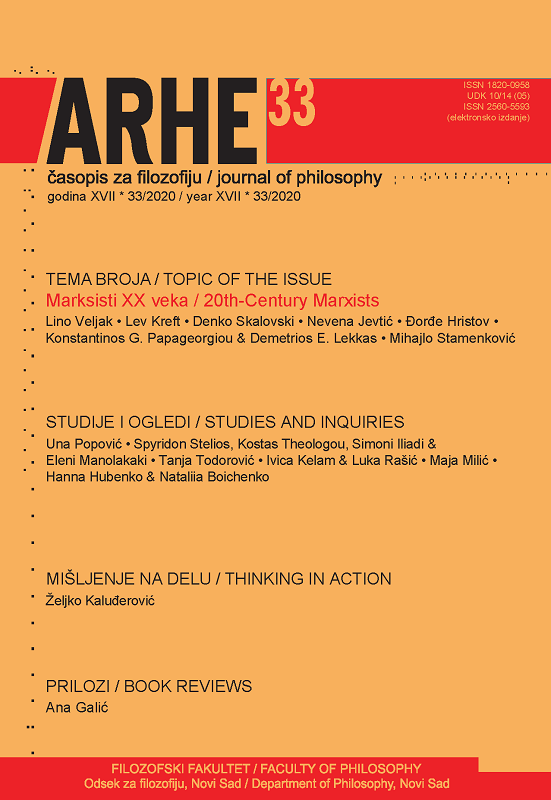GRAMŠI, LINGVISTIČKI PRESTIŽ I HEGEMONIJA
Glavni sadržaj članka
Apstrakt
Autor unakrsno sučeljava tekuća istraživanja teorijsko-praktičkog, a posebno metodološkog, statusa jezika unutar Gramšijevog revolucionarno-filosofskog dela. Preciznije, on nastoji ispitati način, opseg i stepen udela (neo)lingvističkog pojma prestiža u originalnoj sintezi Gramšijevog poimanja hegemonije. Pri tom se izdvaja i prati dijalektička nit koja, reprodukujući se u svakom od parova, ujedno sobom ulančava i njihove uzajamne odnose: između jezika uopšte i pojedinih jezika, između govornika dva različita jezika, između jednog jezika i njegovog dijalekta, između dominantnih i subalternih klasa, između prisile i pristanka, između normativne i spontane gramatike. Autor se zalaže za uvid prema kojem – sveobuhvatan kritički pojam hegemonije kod Gramšija – obavezuje na pristanak da u njemu für ewig već postoji sadržanost (pojma) lingvističkog prestiža.
Detalji članka
Reference
Brandist, C., „The Cultural and Linguistic Dimensions of Hegemony: Aspects of Gramsci’s Debt to Early Soviet Cultural Policy“, Journal of Romance Studies 12(2012): str. 24–43.
Carlucci, A., Gramsci and languages: unification, diversity, hegemony, Brill, Leiden 2013.
Carlucci, A., „Gramsci, Language and Pluralism”, Antonio Gramsci (ed. Mark McNally), Palgrave Macmillan, London 2015, str. 76-94.
Carlucci, A., „The political implications of Antonio Gramsci’s journey through languages, language issues and linguistic disciplines”, Journal of Romance Studies 9 (Summer 2009): 27–46.
Filipović, J., Moć reči: Ogledi iz kritičke sociolingvistike, Zadužbina Andrejević, Beograd 2018.
Filipović J., Transdisciplinary Approach to Language Study: The Complexity Theory Perspective, Palgrave Macmillan, London 2015.
Friedman, K., „Ethical Hegemony”, Rethinking Marxism 21 (July 2009): 355 - 365.
Gramsci, A., Gramsci reader: Selected Writings 1916-1935 (ed. David Forgacs), New York University Press, New York 2000.
Gramsci, A., Selections from Cultural Writings (ed. David Forgacs and Geoffrey Nowell Smith, trans. William Boelhower), ElecBook, London 1999.
Gramsci, A., Selections from Political Writings 1910–1920 (ed. Quintin Hoare, trans. John Matthews), Lawrence &Wishart, London 1977.
Gramsci, A., Selections from the Prison Notebooks (ed. and trans. Quentin Hoare and Geoffrey Nowell Smith), ElecBook, London 1999.
Ives, P., R. Lacorte, „Introduction“, Gramsci, Language, and Translation (ed. Peter Ives and Rocco Lacorte), Lexington Books, Lanham 2010., str. 1-19.
Ives, P., Language and hegemony in Gramsci, Pluto Press, London 2004.
Ives, P., „The Grammar of Hegemony”, Left History 5(1) (1997): 85-103.
Lo Piparo, F., „The Linguistic Roots of Gramsci’s Non-Marxism“, Gramsci, Language, and Translation, Lexington Books, Lanham 2010., str. 19-29.
Rosiello, L., „Linguistics and Marxism in the Thought of Antonio Gramsci“, Gramsci, Language, and Translation, Lexington Books, Lanham 2010., str. 29-51.
